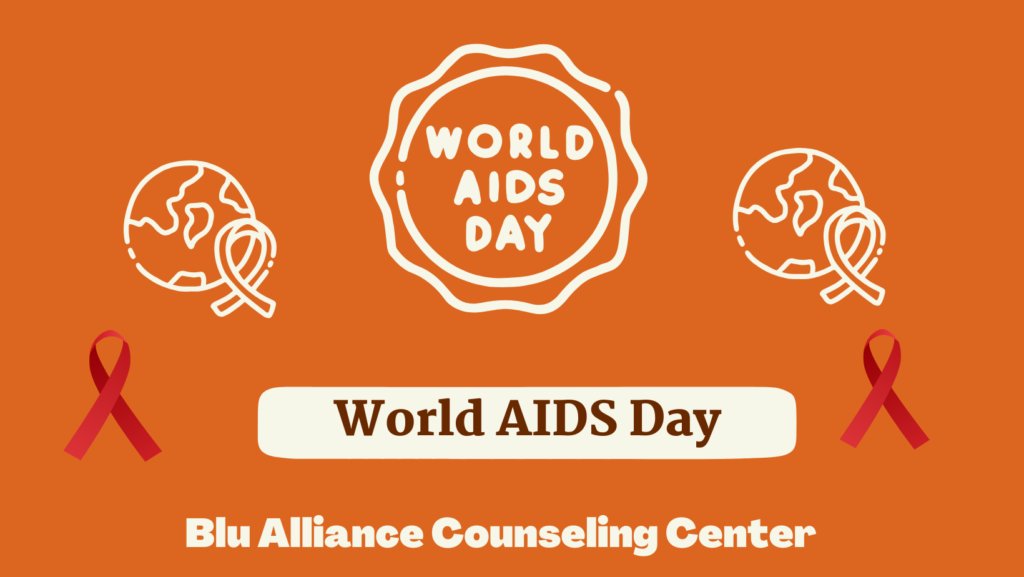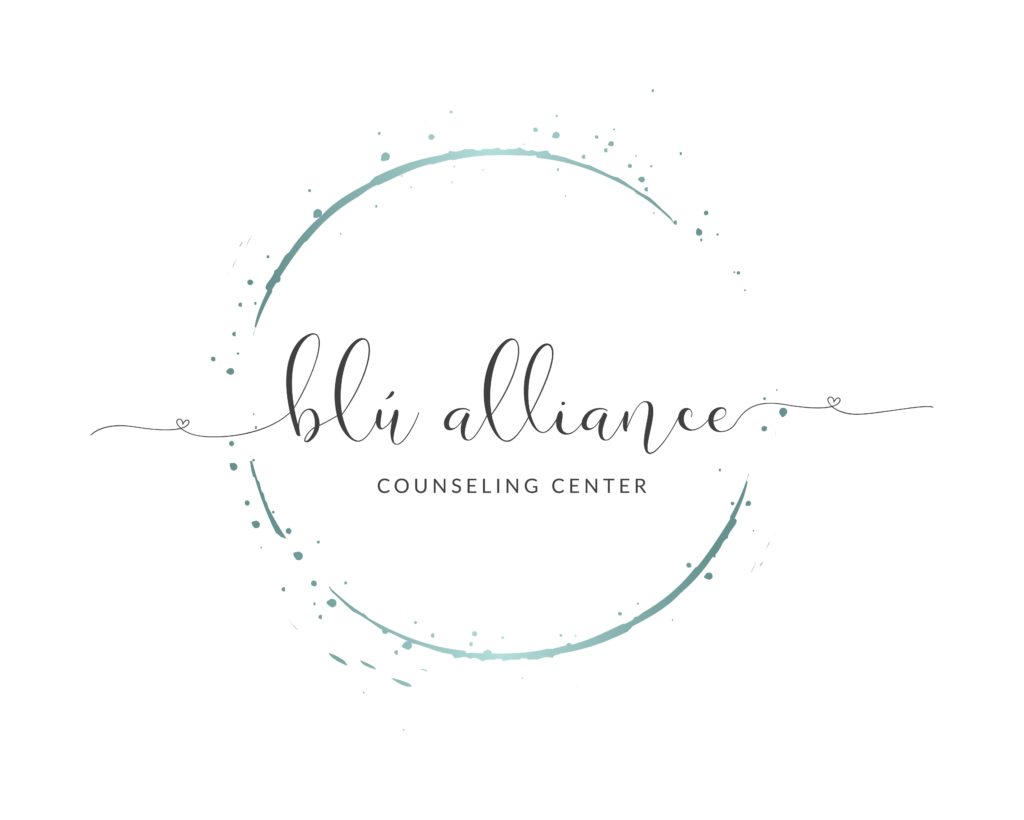
On December 1, 2024, Blu Alliance Counseling Center stood in solidarity with communities worldwide to commemorate World AIDS Day under this year’s powerful theme: “Take the Rights Path: My Health, My Right!” This global event emphasizes the importance of human rights in achieving health equity and ending AIDS as a public health crisis by 2030.
Why World AIDS Day Matters
World AIDS Day is a time for reflection, unity, and action. Since its inception in 1988, it has served as a platform to honor the more than 32 million people who have died from AIDS-related illnesses while highlighting the urgent need for prevention, treatment, and advocacy. Despite significant strides in HIV research, treatment accessibility, and awareness, the fight is far from over:
- In 2023, 39.9 million people globally were living with HIV.
- 630,000 lives were lost to HIV-related illnesses in 2023.
- An estimated 1.3 million people acquired HIV in 2023 (WHO).
Championing Health as a Human Right
Ending the HIV epidemic requires an unwavering commitment to human rights. Protecting the rights of people living with HIV and vulnerable populations is essential to achieving universal health care access. This includes eliminating stigma, discriminatory laws, and barriers that hinder progress.
Key priorities for World AIDS Day 2024 include:
- Ensuring healthcare access for all, regardless of HIV status, background, or identity.
- Empowering individuals with HIV prevention tools and education to stop new infections.
- Addressing stigma and discrimination that undermine effective HIV responses.
- Reaching marginalized groups, including men who have sex with men, transgender individuals, people who use drugs, sex workers, and incarcerated populations (UNAIDS).
Progress and Challenges
The fight against HIV/AIDS has seen remarkable progress:
- Undetectable = Untransmittable (U=U): With early diagnosis and adherence to antiretroviral therapy (ART), individuals living with HIV can suppress their viral load to undetectable levels, meaning they cannot transmit the virus to others.
- Advances in prevention: Tools such as PrEP (pre-exposure prophylaxis) and self-testing have empowered individuals to take charge of their health.
- Global initiatives: Programs like PEPFAR have saved over 20 million lives and significantly reduced new infections (CDC).
However, challenges persist:
- Stigma and discrimination remain barriers to care and treatment.
- Health inequities prevent vulnerable communities from accessing services.
- Gender inequality exacerbates vulnerabilities for women and girls worldwide (UNAIDS).
A Collective Call to Action
This year’s theme extends beyond December 1, serving as a movement to sustain and accelerate progress in the fight against HIV. Organizations like the CDC, HIV.gov, and UNAIDS stress the importance of collective responsibility. Whether through leadership, advocacy, or community engagement, we all have a role to play.
- Learn more about the CDC’s initiatives to align global efforts: CDC World AIDS Day.
- Explore UNAIDS’ campaign: Take the Rights Path.
- Join the global conversation using hashtags #WorldAIDSDay and #StopHIVTogether (HIV.gov).
- Watch inspiring stories of advocacy and empowerment: WHO HIV/AIDS Video Playlist.
Wear the Red Ribbon
The Red Ribbon remains a symbol of solidarity with people living with HIV. Wear it proudly, purchase it through fundraising initiatives, or share a virtual ribbon to amplify awareness. Visit World AIDS Day for resources, fundraising opportunities, and ways to make a difference.
Take Action
- Get Tested: Early detection is vital. Locate a free and confidential HIV testing service near you through CDC’s HIV Locator.
- Educate: Share reliable information and resources to dispel myths and combat stigma.
- Advocate: Support policies that uphold human rights and remove discriminatory laws hindering HIV prevention and treatment.
- Reflect and Remember: Honor the lives of those lost to AIDS-related illnesses and celebrate the resilience of individuals and communities.
Watch and Learn
The following resources feature inspiring stories and voices advocating for change:
- WHO HIV/AIDS Video Playlist
- HIV.gov’s Awareness Videos
- UNAIDS: Take the Rights Path Stories
- National AIDS Memorial’s Surviving Voices Films
Additional Resources:
- World Health Organization: World AIDS Day
- UNAIDS: World AIDS Day
- CDC: World AIDS Day 2024
- HIV.gov: Awareness Days
- World AIDS Day: Get Involved
Mental Health Resources for LGBTQIA+ Individuals
Supporting mental health is crucial in addressing the broader impact of HIV/AIDS, especially within the LGBTQIA+ community. Below are resources that provide specialized support:
- The Trevor Project’s Crisis Resources: Offers 24/7 confidential crisis support for LGBTQ+ youth.
- Text Support: Text ‘START’ to 678-678.
- Phone Support: Call 1-866-488-7386.
- Online Chat: Trevor Project Help.
- Trans Lifeline: Peer support by and for the transgender community: 1-877-565-8860 (Trans Lifeline).
- SAGE National LGBT Elder Hotline: Support for older LGBTQ individuals and caregivers: 1-877-360-LGBT (5428) (SAGE Hotline).
- National Suicide Prevention Lifeline for LGBTQ+ Community: 1-800-273-8255 (Lifeline).
- LGBT National Help Center: Free and confidential support via phone, text, and chat (LGBT Help Center).
- Colors Youth: Free mental health services for LGBTQ youth under 25 (Colors Youth).
- Los Angeles LGBT Center: Comprehensive services for the LGBTQ+ community in Greater Los Angeles (LA LGBT Center).
- National Alliance on Mental Illness (NAMI) LGBTQI Page: Highlights mental health needs and offers support resources (NAMI).
Additional mental health directories include:
- Therapy for Black Girls: Encouraging wellness for Black women and girls (Therapy for Black Girls).
- Therapy for Black Men: Directory to connect men of color with therapists (Therapy for Black Men).
- Latinx Therapy: Destigmatizing mental health within the Latinx community (Latinx Therapy).
- Inclusive Therapists: Social justice-oriented, culturally responsive therapy (Inclusive Therapists).
- Open Path Collective: Affordable therapy for middle- and lower-income individuals (Open Path).
- PFLAG: The nation’s largest LGBTQ+ family and ally organization, with local chapters providing support and advocacy:
- It Gets Better Project: Inspiring global stories of hope and resilience (It Gets Better).
Join Us in Solidarity
At Blu Alliance Counseling Center, we recognize the critical role mental health plays in supporting those living with and affected by HIV. We encourage our community to participate in World AIDS Day learning materials, promote awareness, and advocate for change.
Let us take the rights path together—because health is a human right, and no one should be left behind.
For LGBTQIA+ individuals seeking mental health support, the resources listed above provide essential services and support tailored to unique challenges faced by the community. Prioritizing mental health is a vital component of treatment and awareness of HIV/AIDS and ensures a holistic approach to well-being.
“As Always Blu Specializes In You”

I am the Director of Operations at Blu Alliance Counseling Center. I contribute to the Blu Alliance Blog where my focus is providing information about therapy in a way that is honest, and relatable. My educational background includes a BA in Psychology from Cal State Los Angeles, and an MA in Marriage and Family Therapy from Alliant International University.
